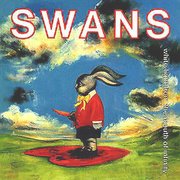Swans (band)
|
|
Swans were one of the few bands to emerge from the New York, USA No Wave scene intact. The band was formed in 1982 by Michael Gira, and employed a shifting line up of musicians between then and their dissolution in 1997.
| Contents |
Early Music
Their early music was typified by slow and grinding guitar noise, and pounded drums, punctuated by Gira's morbid and violent lyrics, usually barked or shouted. Critic Ned Raggett describes Swans' early recordings as "aggressive beyond words." [1] (http://www.allmusic.com/cg/amg.dll?p=amg&sql=10:hz6wtr6qkl3x~T1)
Their debut, Filth (1983), featured driving, choppy rhythms and abrasive drums; some have noted similarities to Black Sabbath's "doomier" moments, but Ragget contends that "early Swans really is like little else on the planet before or since." [2] (http://www.allmusic.com/cg/amg.dll?p=amg&sql=10:66jeea104xs7~T1)
Filth was the first album to feature guitarist Norman Westberg, who would play a vital role in much of Swans' music.
Cop (1984) continues in the same vein, reminiscent of heavy metal music played in extreme slow motion.
1986's Greed saw a new addition to the group with vocalist/keyboardist Jarboe joining the band. Her presence began a slow thawing in the overt brutality and energy of Swans' early work.
Children Of God (1987) further expanded Jarboe's role, acting as a foil to Michael Gira's tales of suffering, torture, and humiliation. The almost baroque "In My Garden", for example, added an extra dimension with piano and acoustic guitar.
The Burning World
The Burning World (1989) was the first and only major label album for Swans. Released on MCA and produced by Bill Laswell it further added to the acoustic element found in Greed.
However the album has been regarded by some fans as a major disappointment, as much of the early line-up was replaced by session musicians and the distinctive heavy guitar element of their earlier work toned down significantly in favor of folk and world music elements.
It was the first Swans album to feature more conventional pop melodies, though Gira's lyrics still favored themes of depression, death, greed and despair, though actually sung, rather than the chanting or shouting typical of earlier material.
Later Music
Michael Gira's disillusionment with their MCA exploits led to White Light From The Mouth Of Infinity (1991), a successful blending of earlier hard rock and later pop styles. Produced by Gira, the album blended acoustic rock, blues and hypnotic guitar noise successfully, producing an album more complex than anything they had released in the past. This album was followed by Love Of Life (1992) and The Great Annihilator (1995).
With other projects occupying his time, Michael Gira decided to bring an end to the group with one last album and world tour. Soundtracks For The Blind (1996) was the result: a mammoth two-disc album comprised of various old recordings, electronic soundscapes, brutal noise-rock epics and acoustic guitar solos; Gira, Jarboe and other long time collaborators created one of the best regarded albums of their career. Swans Are Dead (1998) brings together live recordings from their 1995 and 1997 tours, documenting the energy and stage presence of Michael Gira and Jarboe.
After dissolving Swans, Gira formed Angels of Light.
Discography
Studio Releases
- Swans [EP] - (1982)
- Filth - (1983)
- Cop - (1984)
- Young God - (1984)
- Greed - (1986)
- Holy Money - (1986)
- Children Of God - (1987)
- The Burning World - (1989)
- White Light From The Mouth Of Infinity - (1991)
- Body To Body, Job To Job - (1991)
- Love Of Life - (1992)
- The Great Annihilator - (1995)
- Die Tür Ist Zu [EP] - (1996)
- Soundtracks For The Blind (1996)
Live And Other Releases
- Swans Are Dead [Live] - (1998)
External links
See Also
The Swans is also the nickname for Swansea City Football Club, based in Wales, UK. Their giant mascot, Cyril the Swan, is renowned for his antics.

